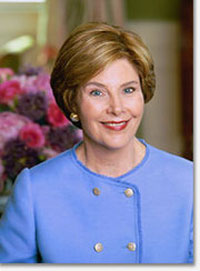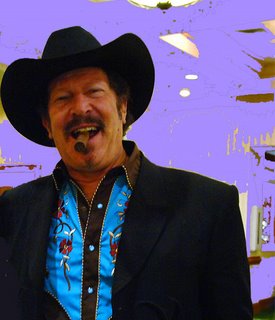Friday, March 31, 2006
Hear Hear for Kinky Friedman
Wednesday, March 29, 2006
On Behalf Of the National Immigration Project
March 29, 2006
Senate to take action on immigration
National Immigration Project Action Alert: Senate to Vote on
Immigration Bills
STATUS: The Senate Judiciary Committee, under Chairman Specter, has
pushed out an immigration bill. Senate Majority Leader Frist is set
to introduce his own bill. Now, both the Frist and the Committee bill
will go to the floor for consideration by the entire Senate. Please
urge your own senators to support the Committee bill as the starting
point for debate.
(1) CALL SENATE MEMBERS. We need to thank the committee members who
voted to include or eliminate key provisions (e.g. elimination of
Title VII, limited removal of retroactivity) two days ago and Chairman
Specter for pushing the Committee to complete a bill. Several members
of the Committee are getting blasted by restrictionists right now. We
need to show them how much we appreciate their courageous votes. So
even if you are NOT a constituent, please be sure to contact the
senators' offices highlighted in bold (Feinstein, DeWine, Graham,
Brownback, and Specter) and offer your thanks!
**Feinstein: 202-224-3841
**DeWine: 202-224-2315
**Graham: 202-224-5972
**Brownback: 202-224-6521
**Specter: 202-224-4254
(2) CALL KENNEDY. Please call his office and thank him for his
wonderful work on the Senate Judiciary Committee and his tireless
courage on behalf of immigrants. His Boston office number is
617-565-3170.
Senate to take action on immigration
National Immigration Project Action Alert: Senate to Vote on
Immigration Bills
STATUS: The Senate Judiciary Committee, under Chairman Specter, has
pushed out an immigration bill. Senate Majority Leader Frist is set
to introduce his own bill. Now, both the Frist and the Committee bill
will go to the floor for consideration by the entire Senate. Please
urge your own senators to support the Committee bill as the starting
point for debate.
(1) CALL SENATE MEMBERS. We need to thank the committee members who
voted to include or eliminate key provisions (e.g. elimination of
Title VII, limited removal of retroactivity) two days ago and Chairman
Specter for pushing the Committee to complete a bill. Several members
of the Committee are getting blasted by restrictionists right now. We
need to show them how much we appreciate their courageous votes. So
even if you are NOT a constituent, please be sure to contact the
senators' offices highlighted in bold (Feinstein, DeWine, Graham,
Brownback, and Specter) and offer your thanks!
**Feinstein: 202-224-3841
**DeWine: 202-224-2315
**Graham: 202-224-5972
**Brownback: 202-224-6521
**Specter: 202-224-4254
(2) CALL KENNEDY. Please call his office and thank him for his
wonderful work on the Senate Judiciary Committee and his tireless
courage on behalf of immigrants. His Boston office number is
617-565-3170.
Tuesday, March 28, 2006
Just Another Day in the White House with Bush
Sunday, March 26, 2006
Laura Bush Gives an Etiquette Lesson
 Mrs. Bush: Well, good morning! Today I am answering some of your letters and questions. I have advice on how to get ahead in the world of men for you darling young ladies and stay at home moms. Gloves on? Smile in place? Let's go!
Mrs. Bush: Well, good morning! Today I am answering some of your letters and questions. I have advice on how to get ahead in the world of men for you darling young ladies and stay at home moms. Gloves on? Smile in place? Let's go!First Question: What should I do, Miss Laura? My husband has a problem with drinking too much and shooting up the house with his Smith and Wesson. Signed, Mrs. Cheney
Mrs. Bush: Well, dear, you must show loyalty and discretion. If anyone in your family should happen to have a substance abuse problem, well, do you air your dirty laundry in public? No! Just love them and help them to read more books and they will get over their cocaine habit. Oh, and do like Mrs. Reagan suggested. Tell them to just say no to drugs and alcohol. You might also keep him away from lawyers for a spell until he dries out.
Well, that's all we have time for today. See you again soon, and remember, read, read, read!!
Saturday, March 25, 2006
Beauty as a Burden
 I saw this recent article:
I saw this recent article:Object Lessons: A Theoretical and Empirical Study of Objectified Body Consciousness in Women
Journal article by Stacey L. Sinclair; Journal of Mental Health Counseling, Vol. 28, 2006
Part of the experience of being a woman, particularly in Western cultures, is being looked at and evaluated by others. Research findings indicate that women are gazed at more than men and that women are more likely to feel "looked at" in interpersonal gatherings (McKinley & Hyde, 1996; Nigro, Hill, Gelbein, & Clark, 1988). In addition, men direct more nonreciprocated gaze toward women than vice versa (Bente, Donaghy, & Suwelack, 1998; Mulac, Studley, Wiemann, & Bradac, 1987), and men's gazing is frequently accompanied by sexually evaluative remarks (Beam, 1974; Gardner, 1980; Henley, 1977). Increasingly, women's experiences of such scrutiny and sexualized appraisal are being explored as an important area of study. In particular, scholars from various disciplines have begun to examine Western culture's widespread practice of sexually objectifying women's bodies and have begun to explore the physical and psychological consequences associated with such objectification (Bordo, 1993; Calogero, 2004; Fredrickson & Roberts, 1997; Kaschak, 1992; McKinley & Hyde; Roberts & Gettman, 2004). What has emerged is a critique of U.S. culture's fixation on the female body and a recognition that women's bodies are inscribed with complex social, economic, and political meanings. Specifically, researchers and mental health professionals have located the female body as the site wherein judgment regarding body weight, shape, and attractiveness is waged (Fredrickson & Roberts; McKinley & Hyde).She remembered through the filmy distance of time that everyone always commented to her mother that she was a beautiful child, her fair skin clear and even, her body slim and her waist small. She had the kind of dark eyes that were old beyond her years, eyes that probed, not just skimming the surface as most other children's eyes did. For all their ordinary brownness, her eyes held one's attention. Her grandmother always spoke up when people praised her for her appearance. Her grandmother told her that beauty was only skin deep, and not to let it turn her head.
As she got older, she began to grow even prettier. In high school, she dated, but never dated athletes. In fact, she secretly looked down on them, thought they had a enlarged sense of entitlement. She found many of them to be aggressive and grabby. She preferred boys who could think and reciprocate, who could see into her soul as her girlfriends could. Those other boys always saw her long blonde hair, but never saw her, and when she quoted Plato or discussed world events, they look startled. Sometimes she did that just for the effect of seeing their eyes glaze over.
 When she was 17, she was nominated for Homecoming Queen by one of the Basketball Captains who possibly had a crush on her. He never told her so, but the way he looked at her spoke volumes. When it was time to show up for assembly to announce the Homecoming nominees, all the other girls were dressed in their high school best, with matching shoes, their beautiful hair brushed and sprayed, their carefully placed purses.
When she was 17, she was nominated for Homecoming Queen by one of the Basketball Captains who possibly had a crush on her. He never told her so, but the way he looked at her spoke volumes. When it was time to show up for assembly to announce the Homecoming nominees, all the other girls were dressed in their high school best, with matching shoes, their beautiful hair brushed and sprayed, their carefully placed purses.She came to the Beauty Queen assembly dressed in blue denim overalls and a red flannel shirt.
There was a collective gasp when she stood up in the darkened assembly room, when the spotlight found her. The other students thought it was an insult to their tradition that she did not make herself look the part. What was she thinking, they asked, as she turned and slowly smiled at them, looking frozen and distant. She didn't know it, but she made enemies that day particularly among the girls who wanted what she rejected.
She hated having the spotlight shine on her, picking her out from the crowd, feeling others look at her. They always looked, sizing up her body, her face, her worth. They insinuated themselves into her private space with their eyes. She forced herself to look back into that sea of faces. She felt frozen in time, felt time stop, felt nothing. “They do not see ME,” she thought, in her blank panic.
 Others girls would have been happy with her looks, more than happy. Other pretty girls used their looks as cash to get what they wanted. She hated that too, the implied selling of oneself, the implication that she was of ornamental value.
Others girls would have been happy with her looks, more than happy. Other pretty girls used their looks as cash to get what they wanted. She hated that too, the implied selling of oneself, the implication that she was of ornamental value.But she also felt conflicted. She was aware that her looks made her life easier in some ways, gave her entry to places where other, plainer girls weren’t invited, but she failed to summon up gratitude for what many considered a gift. Standing out made her feel vulnerable, and sometimes, more than once it made her feel that she was in danger. Sometimes men secretly tried to touch her, or own her, and she retreated, feeling pursued and harried, like a hunted bird.
Once, when she was 16, on vacation in Mexico City with her parents, she walked into a café to meet her parents for lunch. She was shopping in the city with her cousins and the four of them entered the restaurant together, laughing and chatting.
She instantly felt a shock run through her. She became aware of the room and how it shimmered and went into slow motion, felt the precise second when the humming conversation was suspended, and every man in the café turned around to stare at her. She felt her face burn, she felt her father’s pride that he had produced such a striking child. She saw her mother, too, and the sudden assessment in her eyes that her daughter was a child no longer. She wanted to bolt, but couldn't. That was the day she created the habit of getting smaller and smaller until she almost, but not quite disappeared.
And preoccupied as she was with her own fear, she never even noticed until later that the 3 girl cousins who were invisible in the brightness of her own light faded as quickly as she did into their own self-constructed silent background.
Friday, March 24, 2006
Weekly Feminist News Update
Mar 24 2006
Unsafe Abortions Kill 90 African Women Per Day
Experts at the Regional Consultation on Unsafe Abortion in Africa, which ended yesterday, discussed the prevalence of unsafe abortions and how policy changes can change these statistics...
http://www.feminist.org/news/newsbyte/uswirestory.asp?id=9582
Mar 23 2006
Women's Groups Speak Up at World Water Forum
At the Fourth Annual World Water Forum, held this past week in Mexico City, the Women's Caucus called on the conference attendees to uphold women's human right to water by including women in decisions related to water usage and sanitation and by taking gender issues into consideration when making policy...
http://www.feminist.org/news/newsbyte/uswirestory.asp?id=9580
Passing this along from the Feminist Majority Foundation.
Mar 22 2006
Supreme Court Considers Requiring Abuse Victims to Appear in Court
In a decision that could have severe ramifications for victims of domestic violence, the Supreme Court is considering whether plaintiffs in abuse cases are required by the Constitution to appear in court ˆ something that many are afraid to do...
http://www.feminist.org/news/newsbyte/uswirestory.asp?id=9578
Mar 20 2006
Utah Passes Parental Consent Abortion Law
Young women under the age of 18 in Utah will now have to get permission from a parent before obtaining an abortion, and although the consent requirement can be waived in some circumstances, parental notification cannot be...
http://www.feminist.org/news/newsbyte/uswirestory.asp?id=9572
Unsafe Abortions Kill 90 African Women Per Day
Experts at the Regional Consultation on Unsafe Abortion in Africa, which ended yesterday, discussed the prevalence of unsafe abortions and how policy changes can change these statistics...
http://www.feminist.org/news/newsbyte/uswirestory.asp?id=9582
Mar 23 2006
Women's Groups Speak Up at World Water Forum
At the Fourth Annual World Water Forum, held this past week in Mexico City, the Women's Caucus called on the conference attendees to uphold women's human right to water by including women in decisions related to water usage and sanitation and by taking gender issues into consideration when making policy...
http://www.feminist.org/news/newsbyte/uswirestory.asp?id=9580
Passing this along from the Feminist Majority Foundation.
Mar 22 2006
Supreme Court Considers Requiring Abuse Victims to Appear in Court
In a decision that could have severe ramifications for victims of domestic violence, the Supreme Court is considering whether plaintiffs in abuse cases are required by the Constitution to appear in court ˆ something that many are afraid to do...
http://www.feminist.org/news/newsbyte/uswirestory.asp?id=9578
Mar 20 2006
Utah Passes Parental Consent Abortion Law
Young women under the age of 18 in Utah will now have to get permission from a parent before obtaining an abortion, and although the consent requirement can be waived in some circumstances, parental notification cannot be...
http://www.feminist.org/news/newsbyte/uswirestory.asp?id=9572
Monday, March 20, 2006
Pink Feminist Looks Back With Rose-Tinted Glasses
 I vaguely remember visiting my grandparents' ranch in Granbury, Texas. This early memory is mixed in with another one of watching a tornado slither across the horizon on a stormy black-as-night afternoon sky in the Panhandle of Texas. I stood in the orange dirt yard, only 2 years old while my mother hurriedly pulled flapping wet laundry off the clothesline and threw it into a woven plastic hamper. That was what she did. When big things were happening, she usually worried about the small details, like laundry, meals and germs. It is my first and only memory of living in Lubbock a a child.
I vaguely remember visiting my grandparents' ranch in Granbury, Texas. This early memory is mixed in with another one of watching a tornado slither across the horizon on a stormy black-as-night afternoon sky in the Panhandle of Texas. I stood in the orange dirt yard, only 2 years old while my mother hurriedly pulled flapping wet laundry off the clothesline and threw it into a woven plastic hamper. That was what she did. When big things were happening, she usually worried about the small details, like laundry, meals and germs. It is my first and only memory of living in Lubbock a a child.My grandparents lived just west and slightly south of Fort Worth off the big highway that runs from Fort Worth to Amarillo. May-Ma and Papa raised cattle and goats and chickens; it wasn't a large spread, but the land was pretty, rolling and green. He also had a cotton gin at one time that he repaired and got running, but that may have been earlier in his life, when he lived in Oklahoma.
About ten years after Papa sold the ranch, drillers found natural gas on the property. Since he was conservative and frugal by nature, at least as far as his own needs were concerned, he had kept the mineral rights. So he got a little extra income from the natural gas company. I think perhaps some of that was used as seed money which was invested by my father to put all nine of his grandchildren, including me, through college.
When my dad returned from WWII, he married my mom and finished school at Texas A&M. They moved to Houston and then again to Lubbock where he and his only brother Gene opened a lumber yard together. That lasted about two years, at which point my dad dissolved the partnership. My dad, a practical engineer, was not happy when he discovered that my uncle had taken their meager profits and invested in a racehorse without consulting him.
So we all moved to Dallas, where my mom had her fourth child in 6 years. My dad got a job working as an engineer at a company that built large skyscrapers and office complexes and we lived in a small house in a new air-conditioned subdivision that butted up to dairy farm.
We drove to Granbury for holidays until my grandparents sold the ranch and moved to Dallas. My grandfather was one of the founders of the Cotton Exchange and opened an office in the Exchange where he ginned a little coton. He didn't drink or play cards and he was known as a strict Baptist, and an honest businessman.
But this is a sory about my brother, who was a year and a half older than I was. I guess all families have their traits that range from pathology to quirkiness; my big family seemed to have an abundance.
My parents used to take us out to the ranch and let us play with the baby goats. Now baby goats like to play by butting heads to determine dominance and they were also nibblers who tried to eat your clothes. So my brother was put in the pen with the goats and pretty soon they were butting heads while the adults sat back and laughed. This was in the very early days of television, and I have since wondered if there as not much enertainment in thier lives, because I could not imagine doing this to my children. Maybe this was a rite of passage for my brother, a young boy's introduction into the world of men, where he learned that it was not going to be an easy world for the meek.
I remember my mother laughing lightly as she recalled the sight of him in his tiny corduroy overalls, making fingerstick horns on his head like a baby goat. Butting heads with baby goats seemed normal to me until I became old enough to realize that it was just weird.

















